Research Methods: Quantitative vs. Qualitative Approaches Examined
VerifiedAdded on 2019/12/28
|9
|2676
|277
Report
AI Summary
This report provides a comprehensive overview of the research process, differentiating between quantitative and qualitative research methodologies. It highlights the characteristics, strengths, and weaknesses of each approach, including their application in healthcare settings. The report examines a specific study on palliative care for individuals with dementia, detailing the research type, purpose, and methodology employed, including semi-structured interviews and thematic analysis. It evaluates the study's contribution to theory and practice, potential questions for further research, and the validity, reliability, and ethical considerations of the research. The report emphasizes the importance of ethical practices, data validity, and the use of appropriate research tools. Furthermore, the report discusses the design of palliative care models and the factors influencing the quality of care services for dementia patients, and the importance of understanding the patient's experiences. This report is a valuable resource for students and researchers seeking to understand the nuances of research methodologies and their implications in healthcare.

Introduction to the Research Process
Paraphrase This Document
Need a fresh take? Get an instant paraphrase of this document with our AI Paraphraser
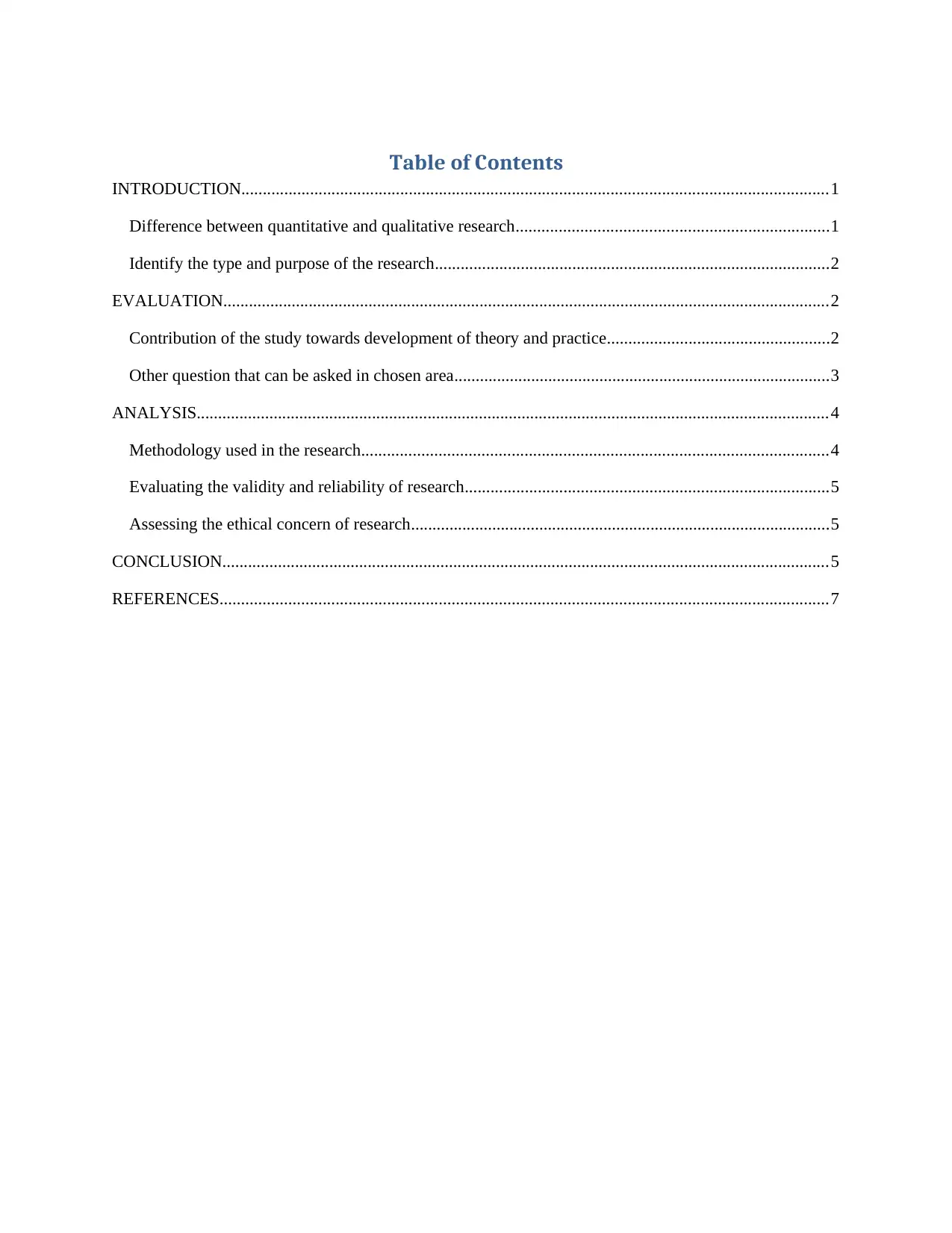
Table of Contents
INTRODUCTION.........................................................................................................................................1
Difference between quantitative and qualitative research.........................................................................1
Identify the type and purpose of the research............................................................................................2
EVALUATION..............................................................................................................................................2
Contribution of the study towards development of theory and practice....................................................2
Other question that can be asked in chosen area........................................................................................3
ANALYSIS....................................................................................................................................................4
Methodology used in the research.............................................................................................................4
Evaluating the validity and reliability of research.....................................................................................5
Assessing the ethical concern of research..................................................................................................5
CONCLUSION..............................................................................................................................................5
REFERENCES..............................................................................................................................................7
INTRODUCTION.........................................................................................................................................1
Difference between quantitative and qualitative research.........................................................................1
Identify the type and purpose of the research............................................................................................2
EVALUATION..............................................................................................................................................2
Contribution of the study towards development of theory and practice....................................................2
Other question that can be asked in chosen area........................................................................................3
ANALYSIS....................................................................................................................................................4
Methodology used in the research.............................................................................................................4
Evaluating the validity and reliability of research.....................................................................................5
Assessing the ethical concern of research..................................................................................................5
CONCLUSION..............................................................................................................................................5
REFERENCES..............................................................................................................................................7
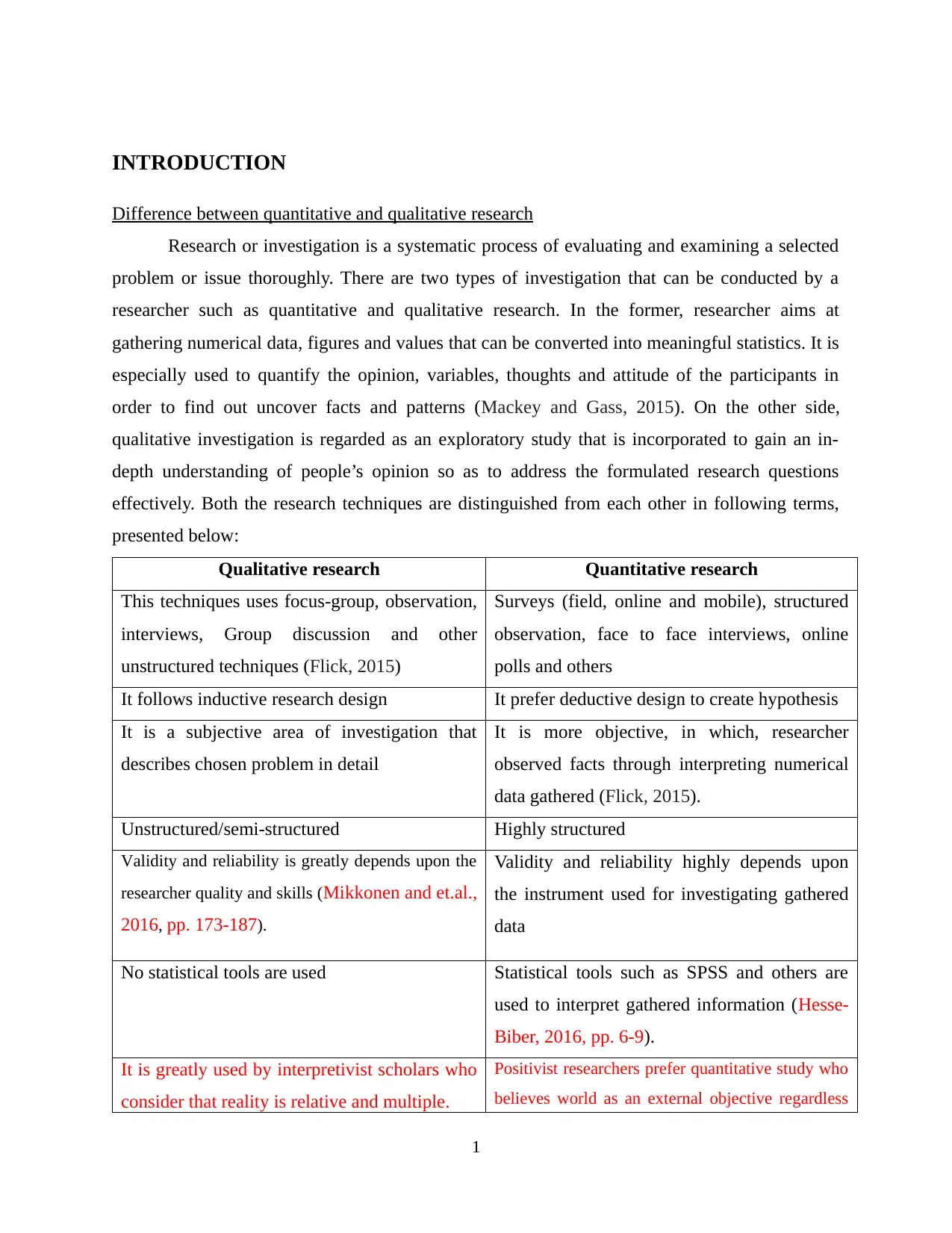
INTRODUCTION
Difference between quantitative and qualitative research
Research or investigation is a systematic process of evaluating and examining a selected
problem or issue thoroughly. There are two types of investigation that can be conducted by a
researcher such as quantitative and qualitative research. In the former, researcher aims at
gathering numerical data, figures and values that can be converted into meaningful statistics. It is
especially used to quantify the opinion, variables, thoughts and attitude of the participants in
order to find out uncover facts and patterns (Mackey and Gass, 2015). On the other side,
qualitative investigation is regarded as an exploratory study that is incorporated to gain an in-
depth understanding of people’s opinion so as to address the formulated research questions
effectively. Both the research techniques are distinguished from each other in following terms,
presented below:
Qualitative research Quantitative research
This techniques uses focus-group, observation,
interviews, Group discussion and other
unstructured techniques (Flick, 2015)
Surveys (field, online and mobile), structured
observation, face to face interviews, online
polls and others
It follows inductive research design It prefer deductive design to create hypothesis
It is a subjective area of investigation that
describes chosen problem in detail
It is more objective, in which, researcher
observed facts through interpreting numerical
data gathered (Flick, 2015).
Unstructured/semi-structured Highly structured
Validity and reliability is greatly depends upon the
researcher quality and skills (Mikkonen and et.al.,
2016, pp. 173-187).
Validity and reliability highly depends upon
the instrument used for investigating gathered
data
No statistical tools are used Statistical tools such as SPSS and others are
used to interpret gathered information (Hesse-
Biber, 2016, pp. 6-9).
It is greatly used by interpretivist scholars who
consider that reality is relative and multiple.
Positivist researchers prefer quantitative study who
believes world as an external objective regardless
1
Difference between quantitative and qualitative research
Research or investigation is a systematic process of evaluating and examining a selected
problem or issue thoroughly. There are two types of investigation that can be conducted by a
researcher such as quantitative and qualitative research. In the former, researcher aims at
gathering numerical data, figures and values that can be converted into meaningful statistics. It is
especially used to quantify the opinion, variables, thoughts and attitude of the participants in
order to find out uncover facts and patterns (Mackey and Gass, 2015). On the other side,
qualitative investigation is regarded as an exploratory study that is incorporated to gain an in-
depth understanding of people’s opinion so as to address the formulated research questions
effectively. Both the research techniques are distinguished from each other in following terms,
presented below:
Qualitative research Quantitative research
This techniques uses focus-group, observation,
interviews, Group discussion and other
unstructured techniques (Flick, 2015)
Surveys (field, online and mobile), structured
observation, face to face interviews, online
polls and others
It follows inductive research design It prefer deductive design to create hypothesis
It is a subjective area of investigation that
describes chosen problem in detail
It is more objective, in which, researcher
observed facts through interpreting numerical
data gathered (Flick, 2015).
Unstructured/semi-structured Highly structured
Validity and reliability is greatly depends upon the
researcher quality and skills (Mikkonen and et.al.,
2016, pp. 173-187).
Validity and reliability highly depends upon
the instrument used for investigating gathered
data
No statistical tools are used Statistical tools such as SPSS and others are
used to interpret gathered information (Hesse-
Biber, 2016, pp. 6-9).
It is greatly used by interpretivist scholars who
consider that reality is relative and multiple.
Positivist researchers prefer quantitative study who
believes world as an external objective regardless
1
⊘ This is a preview!⊘
Do you want full access?
Subscribe today to unlock all pages.

Trusted by 1+ million students worldwide
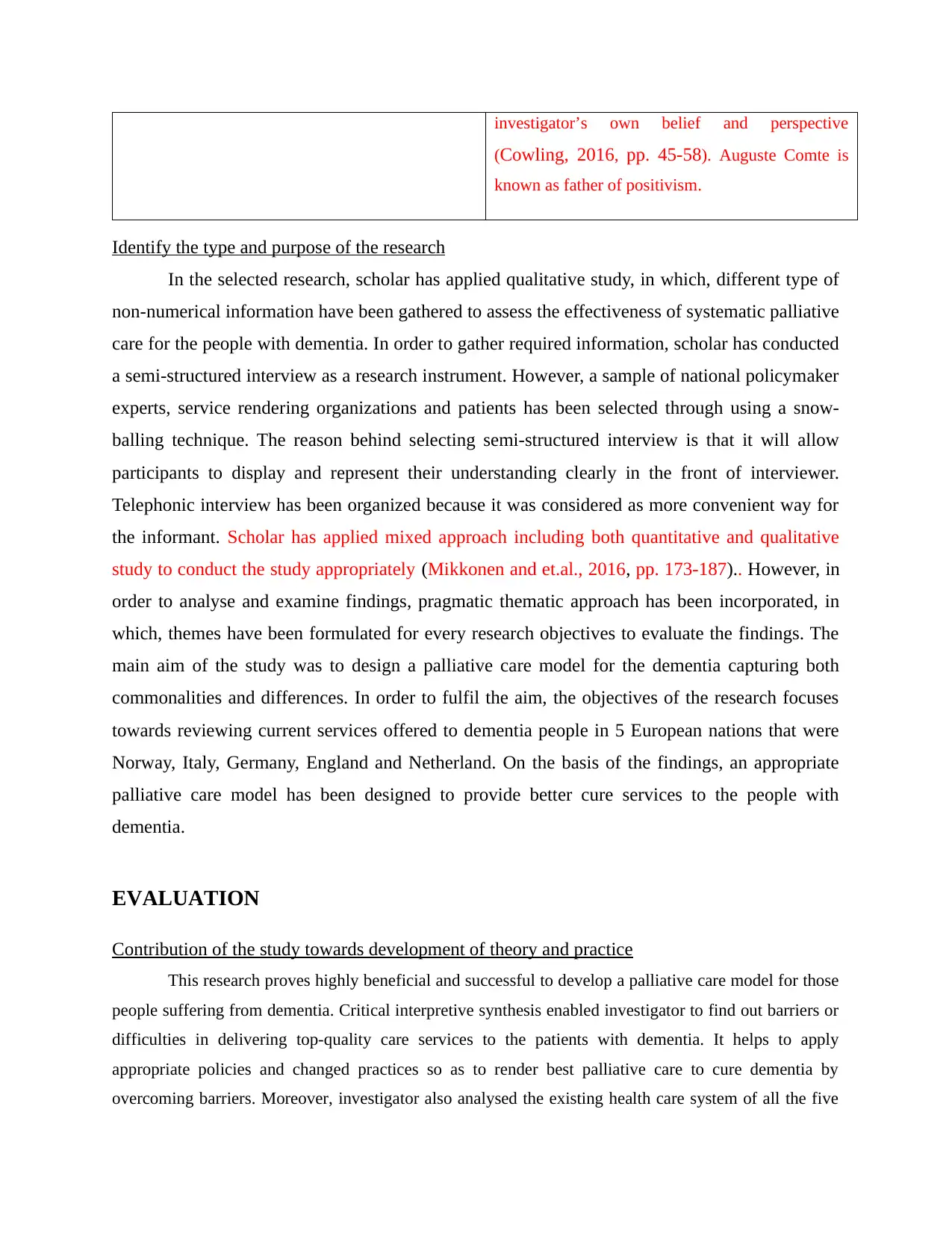
investigator’s own belief and perspective
(Cowling, 2016, pp. 45-58). Auguste Comte is
known as father of positivism.
Identify the type and purpose of the research
In the selected research, scholar has applied qualitative study, in which, different type of
non-numerical information have been gathered to assess the effectiveness of systematic palliative
care for the people with dementia. In order to gather required information, scholar has conducted
a semi-structured interview as a research instrument. However, a sample of national policymaker
experts, service rendering organizations and patients has been selected through using a snow-
balling technique. The reason behind selecting semi-structured interview is that it will allow
participants to display and represent their understanding clearly in the front of interviewer.
Telephonic interview has been organized because it was considered as more convenient way for
the informant. Scholar has applied mixed approach including both quantitative and qualitative
study to conduct the study appropriately (Mikkonen and et.al., 2016, pp. 173-187).. However, in
order to analyse and examine findings, pragmatic thematic approach has been incorporated, in
which, themes have been formulated for every research objectives to evaluate the findings. The
main aim of the study was to design a palliative care model for the dementia capturing both
commonalities and differences. In order to fulfil the aim, the objectives of the research focuses
towards reviewing current services offered to dementia people in 5 European nations that were
Norway, Italy, Germany, England and Netherland. On the basis of the findings, an appropriate
palliative care model has been designed to provide better cure services to the people with
dementia.
EVALUATION
Contribution of the study towards development of theory and practice
This research proves highly beneficial and successful to develop a palliative care model for those
people suffering from dementia. Critical interpretive synthesis enabled investigator to find out barriers or
difficulties in delivering top-quality care services to the patients with dementia. It helps to apply
appropriate policies and changed practices so as to render best palliative care to cure dementia by
overcoming barriers. Moreover, investigator also analysed the existing health care system of all the five
(Cowling, 2016, pp. 45-58). Auguste Comte is
known as father of positivism.
Identify the type and purpose of the research
In the selected research, scholar has applied qualitative study, in which, different type of
non-numerical information have been gathered to assess the effectiveness of systematic palliative
care for the people with dementia. In order to gather required information, scholar has conducted
a semi-structured interview as a research instrument. However, a sample of national policymaker
experts, service rendering organizations and patients has been selected through using a snow-
balling technique. The reason behind selecting semi-structured interview is that it will allow
participants to display and represent their understanding clearly in the front of interviewer.
Telephonic interview has been organized because it was considered as more convenient way for
the informant. Scholar has applied mixed approach including both quantitative and qualitative
study to conduct the study appropriately (Mikkonen and et.al., 2016, pp. 173-187).. However, in
order to analyse and examine findings, pragmatic thematic approach has been incorporated, in
which, themes have been formulated for every research objectives to evaluate the findings. The
main aim of the study was to design a palliative care model for the dementia capturing both
commonalities and differences. In order to fulfil the aim, the objectives of the research focuses
towards reviewing current services offered to dementia people in 5 European nations that were
Norway, Italy, Germany, England and Netherland. On the basis of the findings, an appropriate
palliative care model has been designed to provide better cure services to the people with
dementia.
EVALUATION
Contribution of the study towards development of theory and practice
This research proves highly beneficial and successful to develop a palliative care model for those
people suffering from dementia. Critical interpretive synthesis enabled investigator to find out barriers or
difficulties in delivering top-quality care services to the patients with dementia. It helps to apply
appropriate policies and changed practices so as to render best palliative care to cure dementia by
overcoming barriers. Moreover, investigator also analysed the existing health care system of all the five
Paraphrase This Document
Need a fresh take? Get an instant paraphrase of this document with our AI Paraphraser
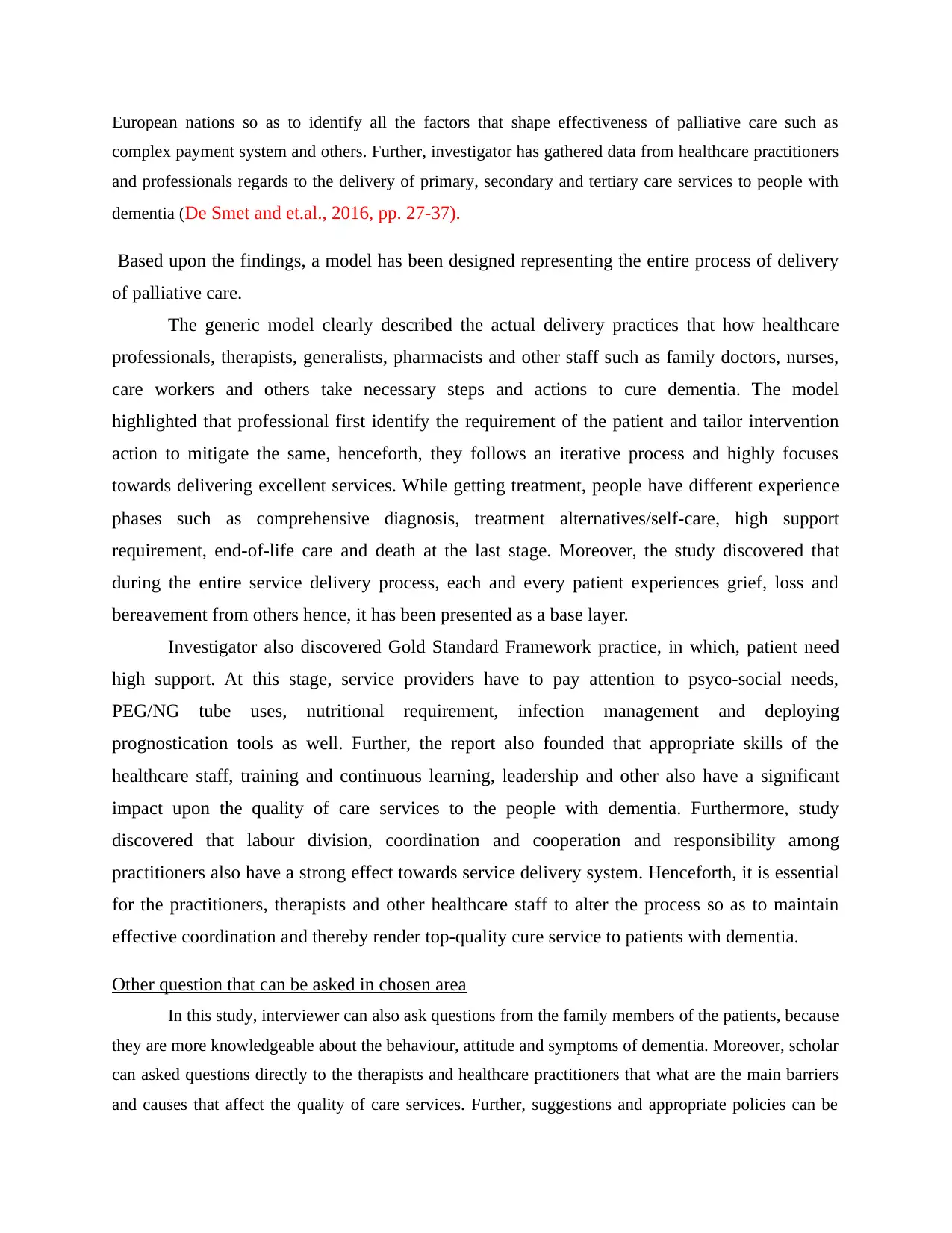
European nations so as to identify all the factors that shape effectiveness of palliative care such as
complex payment system and others. Further, investigator has gathered data from healthcare practitioners
and professionals regards to the delivery of primary, secondary and tertiary care services to people with
dementia (De Smet and et.al., 2016, pp. 27-37).
Based upon the findings, a model has been designed representing the entire process of delivery
of palliative care.
The generic model clearly described the actual delivery practices that how healthcare
professionals, therapists, generalists, pharmacists and other staff such as family doctors, nurses,
care workers and others take necessary steps and actions to cure dementia. The model
highlighted that professional first identify the requirement of the patient and tailor intervention
action to mitigate the same, henceforth, they follows an iterative process and highly focuses
towards delivering excellent services. While getting treatment, people have different experience
phases such as comprehensive diagnosis, treatment alternatives/self-care, high support
requirement, end-of-life care and death at the last stage. Moreover, the study discovered that
during the entire service delivery process, each and every patient experiences grief, loss and
bereavement from others hence, it has been presented as a base layer.
Investigator also discovered Gold Standard Framework practice, in which, patient need
high support. At this stage, service providers have to pay attention to psyco-social needs,
PEG/NG tube uses, nutritional requirement, infection management and deploying
prognostication tools as well. Further, the report also founded that appropriate skills of the
healthcare staff, training and continuous learning, leadership and other also have a significant
impact upon the quality of care services to the people with dementia. Furthermore, study
discovered that labour division, coordination and cooperation and responsibility among
practitioners also have a strong effect towards service delivery system. Henceforth, it is essential
for the practitioners, therapists and other healthcare staff to alter the process so as to maintain
effective coordination and thereby render top-quality cure service to patients with dementia.
Other question that can be asked in chosen area
In this study, interviewer can also ask questions from the family members of the patients, because
they are more knowledgeable about the behaviour, attitude and symptoms of dementia. Moreover, scholar
can asked questions directly to the therapists and healthcare practitioners that what are the main barriers
and causes that affect the quality of care services. Further, suggestions and appropriate policies can be
complex payment system and others. Further, investigator has gathered data from healthcare practitioners
and professionals regards to the delivery of primary, secondary and tertiary care services to people with
dementia (De Smet and et.al., 2016, pp. 27-37).
Based upon the findings, a model has been designed representing the entire process of delivery
of palliative care.
The generic model clearly described the actual delivery practices that how healthcare
professionals, therapists, generalists, pharmacists and other staff such as family doctors, nurses,
care workers and others take necessary steps and actions to cure dementia. The model
highlighted that professional first identify the requirement of the patient and tailor intervention
action to mitigate the same, henceforth, they follows an iterative process and highly focuses
towards delivering excellent services. While getting treatment, people have different experience
phases such as comprehensive diagnosis, treatment alternatives/self-care, high support
requirement, end-of-life care and death at the last stage. Moreover, the study discovered that
during the entire service delivery process, each and every patient experiences grief, loss and
bereavement from others hence, it has been presented as a base layer.
Investigator also discovered Gold Standard Framework practice, in which, patient need
high support. At this stage, service providers have to pay attention to psyco-social needs,
PEG/NG tube uses, nutritional requirement, infection management and deploying
prognostication tools as well. Further, the report also founded that appropriate skills of the
healthcare staff, training and continuous learning, leadership and other also have a significant
impact upon the quality of care services to the people with dementia. Furthermore, study
discovered that labour division, coordination and cooperation and responsibility among
practitioners also have a strong effect towards service delivery system. Henceforth, it is essential
for the practitioners, therapists and other healthcare staff to alter the process so as to maintain
effective coordination and thereby render top-quality cure service to patients with dementia.
Other question that can be asked in chosen area
In this study, interviewer can also ask questions from the family members of the patients, because
they are more knowledgeable about the behaviour, attitude and symptoms of dementia. Moreover, scholar
can asked questions directly to the therapists and healthcare practitioners that what are the main barriers
and causes that affect the quality of care services. Further, suggestions and appropriate policies can be
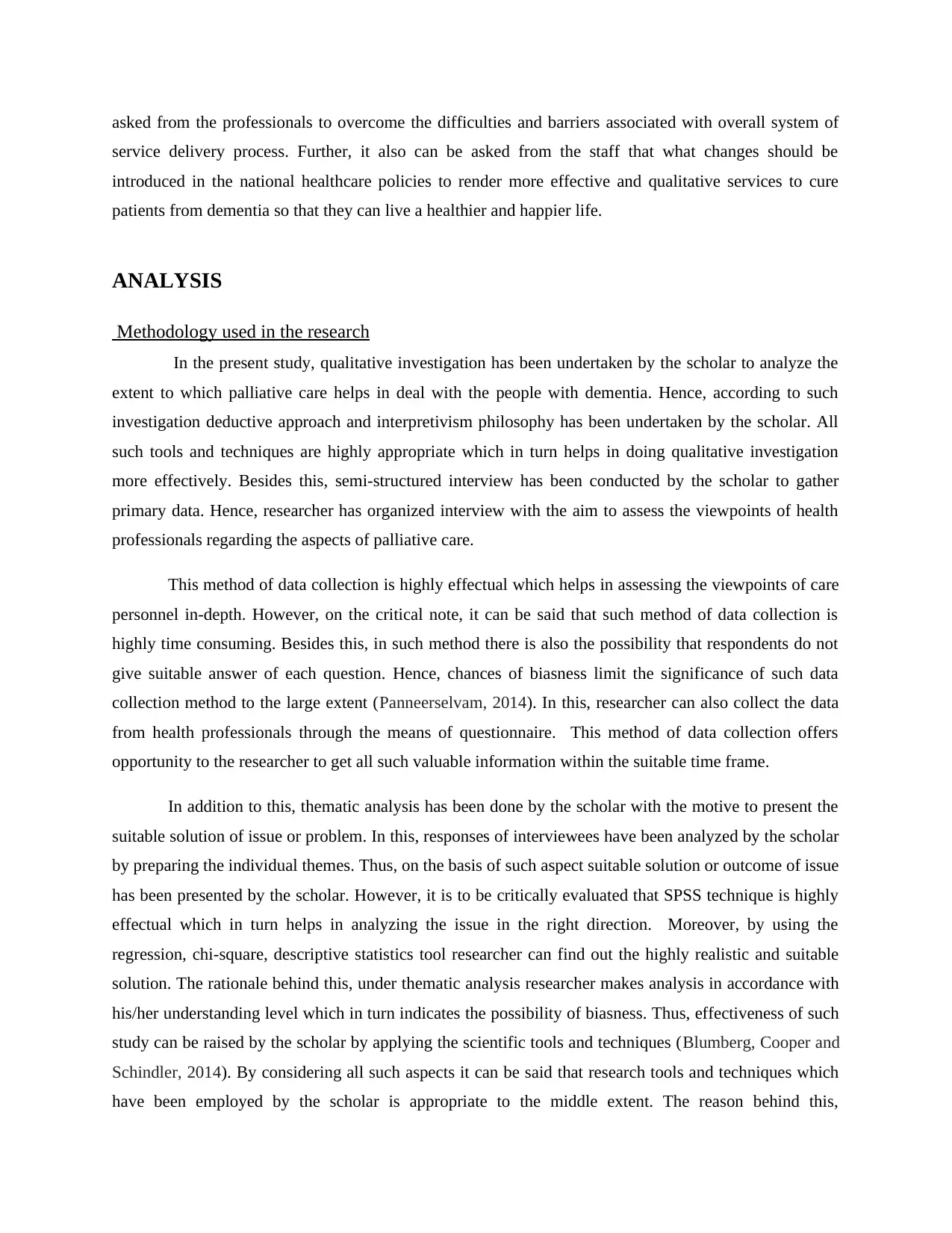
asked from the professionals to overcome the difficulties and barriers associated with overall system of
service delivery process. Further, it also can be asked from the staff that what changes should be
introduced in the national healthcare policies to render more effective and qualitative services to cure
patients from dementia so that they can live a healthier and happier life.
ANALYSIS
Methodology used in the research
In the present study, qualitative investigation has been undertaken by the scholar to analyze the
extent to which palliative care helps in deal with the people with dementia. Hence, according to such
investigation deductive approach and interpretivism philosophy has been undertaken by the scholar. All
such tools and techniques are highly appropriate which in turn helps in doing qualitative investigation
more effectively. Besides this, semi-structured interview has been conducted by the scholar to gather
primary data. Hence, researcher has organized interview with the aim to assess the viewpoints of health
professionals regarding the aspects of palliative care.
This method of data collection is highly effectual which helps in assessing the viewpoints of care
personnel in-depth. However, on the critical note, it can be said that such method of data collection is
highly time consuming. Besides this, in such method there is also the possibility that respondents do not
give suitable answer of each question. Hence, chances of biasness limit the significance of such data
collection method to the large extent (Panneerselvam, 2014). In this, researcher can also collect the data
from health professionals through the means of questionnaire. This method of data collection offers
opportunity to the researcher to get all such valuable information within the suitable time frame.
In addition to this, thematic analysis has been done by the scholar with the motive to present the
suitable solution of issue or problem. In this, responses of interviewees have been analyzed by the scholar
by preparing the individual themes. Thus, on the basis of such aspect suitable solution or outcome of issue
has been presented by the scholar. However, it is to be critically evaluated that SPSS technique is highly
effectual which in turn helps in analyzing the issue in the right direction. Moreover, by using the
regression, chi-square, descriptive statistics tool researcher can find out the highly realistic and suitable
solution. The rationale behind this, under thematic analysis researcher makes analysis in accordance with
his/her understanding level which in turn indicates the possibility of biasness. Thus, effectiveness of such
study can be raised by the scholar by applying the scientific tools and techniques (Blumberg, Cooper and
Schindler, 2014). By considering all such aspects it can be said that research tools and techniques which
have been employed by the scholar is appropriate to the middle extent. The reason behind this,
service delivery process. Further, it also can be asked from the staff that what changes should be
introduced in the national healthcare policies to render more effective and qualitative services to cure
patients from dementia so that they can live a healthier and happier life.
ANALYSIS
Methodology used in the research
In the present study, qualitative investigation has been undertaken by the scholar to analyze the
extent to which palliative care helps in deal with the people with dementia. Hence, according to such
investigation deductive approach and interpretivism philosophy has been undertaken by the scholar. All
such tools and techniques are highly appropriate which in turn helps in doing qualitative investigation
more effectively. Besides this, semi-structured interview has been conducted by the scholar to gather
primary data. Hence, researcher has organized interview with the aim to assess the viewpoints of health
professionals regarding the aspects of palliative care.
This method of data collection is highly effectual which helps in assessing the viewpoints of care
personnel in-depth. However, on the critical note, it can be said that such method of data collection is
highly time consuming. Besides this, in such method there is also the possibility that respondents do not
give suitable answer of each question. Hence, chances of biasness limit the significance of such data
collection method to the large extent (Panneerselvam, 2014). In this, researcher can also collect the data
from health professionals through the means of questionnaire. This method of data collection offers
opportunity to the researcher to get all such valuable information within the suitable time frame.
In addition to this, thematic analysis has been done by the scholar with the motive to present the
suitable solution of issue or problem. In this, responses of interviewees have been analyzed by the scholar
by preparing the individual themes. Thus, on the basis of such aspect suitable solution or outcome of issue
has been presented by the scholar. However, it is to be critically evaluated that SPSS technique is highly
effectual which in turn helps in analyzing the issue in the right direction. Moreover, by using the
regression, chi-square, descriptive statistics tool researcher can find out the highly realistic and suitable
solution. The rationale behind this, under thematic analysis researcher makes analysis in accordance with
his/her understanding level which in turn indicates the possibility of biasness. Thus, effectiveness of such
study can be raised by the scholar by applying the scientific tools and techniques (Blumberg, Cooper and
Schindler, 2014). By considering all such aspects it can be said that research tools and techniques which
have been employed by the scholar is appropriate to the middle extent. The reason behind this,
⊘ This is a preview!⊘
Do you want full access?
Subscribe today to unlock all pages.

Trusted by 1+ million students worldwide
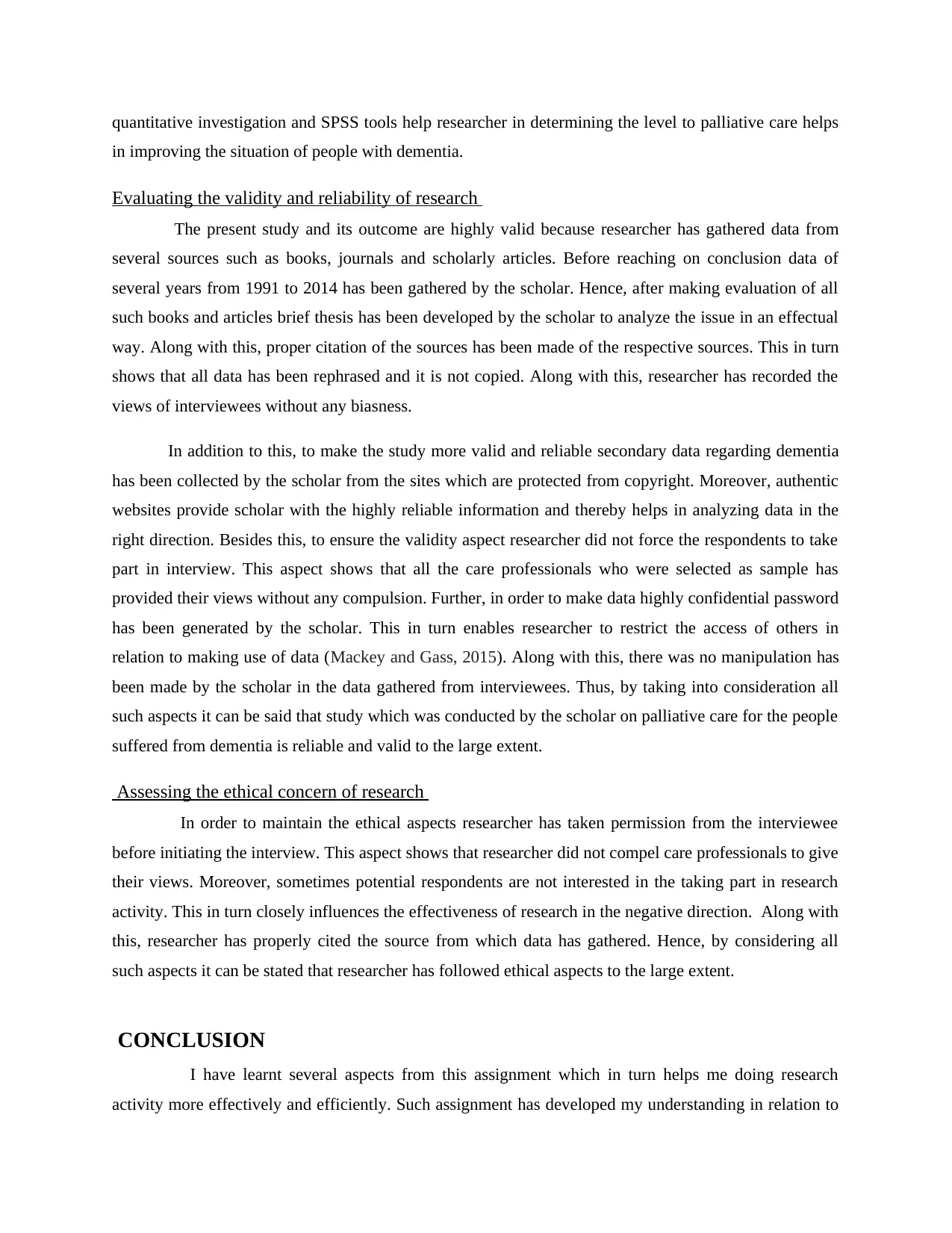
quantitative investigation and SPSS tools help researcher in determining the level to palliative care helps
in improving the situation of people with dementia.
Evaluating the validity and reliability of research
The present study and its outcome are highly valid because researcher has gathered data from
several sources such as books, journals and scholarly articles. Before reaching on conclusion data of
several years from 1991 to 2014 has been gathered by the scholar. Hence, after making evaluation of all
such books and articles brief thesis has been developed by the scholar to analyze the issue in an effectual
way. Along with this, proper citation of the sources has been made of the respective sources. This in turn
shows that all data has been rephrased and it is not copied. Along with this, researcher has recorded the
views of interviewees without any biasness.
In addition to this, to make the study more valid and reliable secondary data regarding dementia
has been collected by the scholar from the sites which are protected from copyright. Moreover, authentic
websites provide scholar with the highly reliable information and thereby helps in analyzing data in the
right direction. Besides this, to ensure the validity aspect researcher did not force the respondents to take
part in interview. This aspect shows that all the care professionals who were selected as sample has
provided their views without any compulsion. Further, in order to make data highly confidential password
has been generated by the scholar. This in turn enables researcher to restrict the access of others in
relation to making use of data (Mackey and Gass, 2015). Along with this, there was no manipulation has
been made by the scholar in the data gathered from interviewees. Thus, by taking into consideration all
such aspects it can be said that study which was conducted by the scholar on palliative care for the people
suffered from dementia is reliable and valid to the large extent.
Assessing the ethical concern of research
In order to maintain the ethical aspects researcher has taken permission from the interviewee
before initiating the interview. This aspect shows that researcher did not compel care professionals to give
their views. Moreover, sometimes potential respondents are not interested in the taking part in research
activity. This in turn closely influences the effectiveness of research in the negative direction. Along with
this, researcher has properly cited the source from which data has gathered. Hence, by considering all
such aspects it can be stated that researcher has followed ethical aspects to the large extent.
CONCLUSION
I have learnt several aspects from this assignment which in turn helps me doing research
activity more effectively and efficiently. Such assignment has developed my understanding in relation to
in improving the situation of people with dementia.
Evaluating the validity and reliability of research
The present study and its outcome are highly valid because researcher has gathered data from
several sources such as books, journals and scholarly articles. Before reaching on conclusion data of
several years from 1991 to 2014 has been gathered by the scholar. Hence, after making evaluation of all
such books and articles brief thesis has been developed by the scholar to analyze the issue in an effectual
way. Along with this, proper citation of the sources has been made of the respective sources. This in turn
shows that all data has been rephrased and it is not copied. Along with this, researcher has recorded the
views of interviewees without any biasness.
In addition to this, to make the study more valid and reliable secondary data regarding dementia
has been collected by the scholar from the sites which are protected from copyright. Moreover, authentic
websites provide scholar with the highly reliable information and thereby helps in analyzing data in the
right direction. Besides this, to ensure the validity aspect researcher did not force the respondents to take
part in interview. This aspect shows that all the care professionals who were selected as sample has
provided their views without any compulsion. Further, in order to make data highly confidential password
has been generated by the scholar. This in turn enables researcher to restrict the access of others in
relation to making use of data (Mackey and Gass, 2015). Along with this, there was no manipulation has
been made by the scholar in the data gathered from interviewees. Thus, by taking into consideration all
such aspects it can be said that study which was conducted by the scholar on palliative care for the people
suffered from dementia is reliable and valid to the large extent.
Assessing the ethical concern of research
In order to maintain the ethical aspects researcher has taken permission from the interviewee
before initiating the interview. This aspect shows that researcher did not compel care professionals to give
their views. Moreover, sometimes potential respondents are not interested in the taking part in research
activity. This in turn closely influences the effectiveness of research in the negative direction. Along with
this, researcher has properly cited the source from which data has gathered. Hence, by considering all
such aspects it can be stated that researcher has followed ethical aspects to the large extent.
CONCLUSION
I have learnt several aspects from this assignment which in turn helps me doing research
activity more effectively and efficiently. Such assignment has developed my understanding in relation to
Paraphrase This Document
Need a fresh take? Get an instant paraphrase of this document with our AI Paraphraser
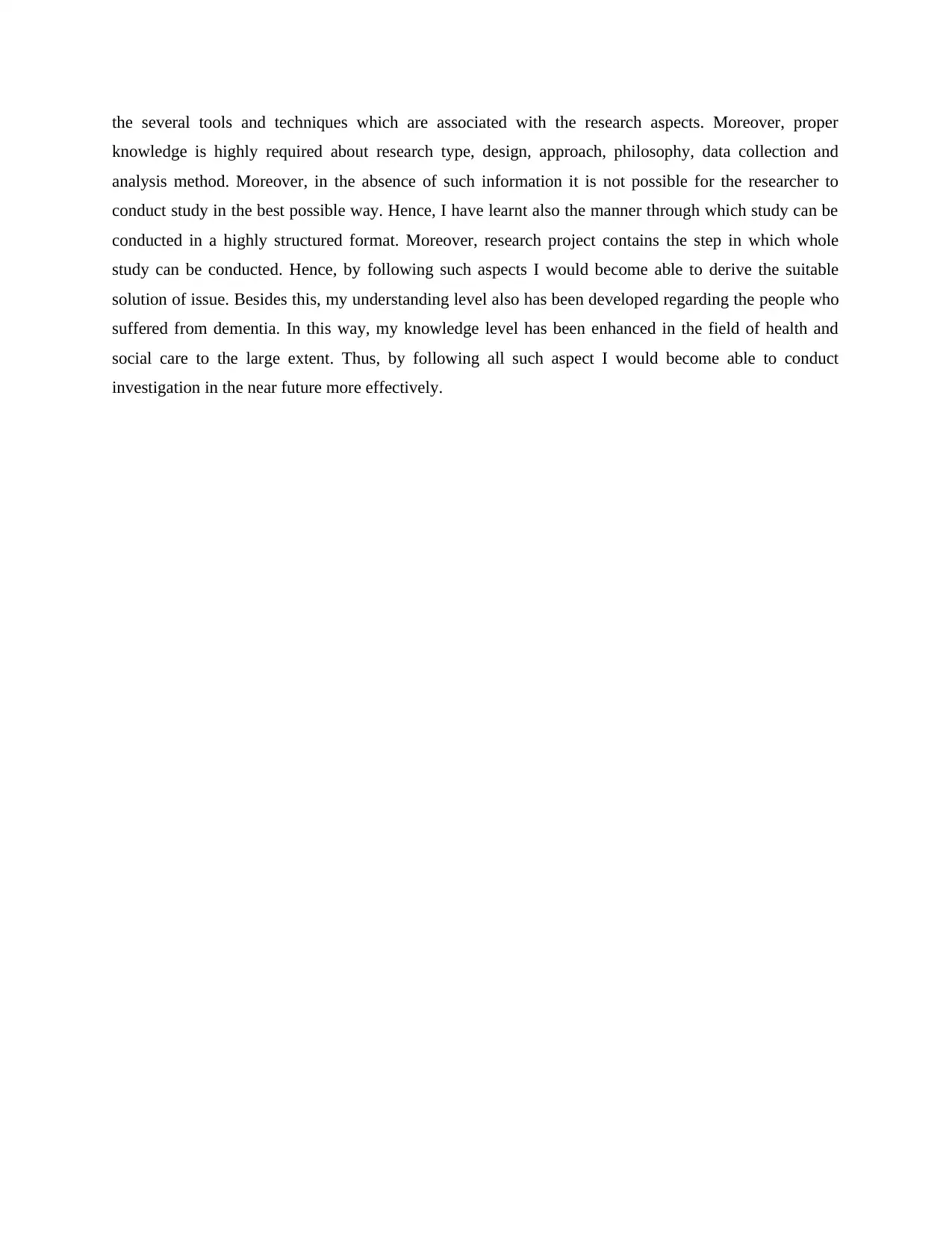
the several tools and techniques which are associated with the research aspects. Moreover, proper
knowledge is highly required about research type, design, approach, philosophy, data collection and
analysis method. Moreover, in the absence of such information it is not possible for the researcher to
conduct study in the best possible way. Hence, I have learnt also the manner through which study can be
conducted in a highly structured format. Moreover, research project contains the step in which whole
study can be conducted. Hence, by following such aspects I would become able to derive the suitable
solution of issue. Besides this, my understanding level also has been developed regarding the people who
suffered from dementia. In this way, my knowledge level has been enhanced in the field of health and
social care to the large extent. Thus, by following all such aspect I would become able to conduct
investigation in the near future more effectively.
knowledge is highly required about research type, design, approach, philosophy, data collection and
analysis method. Moreover, in the absence of such information it is not possible for the researcher to
conduct study in the best possible way. Hence, I have learnt also the manner through which study can be
conducted in a highly structured format. Moreover, research project contains the step in which whole
study can be conducted. Hence, by following such aspects I would become able to derive the suitable
solution of issue. Besides this, my understanding level also has been developed regarding the people who
suffered from dementia. In this way, my knowledge level has been enhanced in the field of health and
social care to the large extent. Thus, by following all such aspect I would become able to conduct
investigation in the near future more effectively.
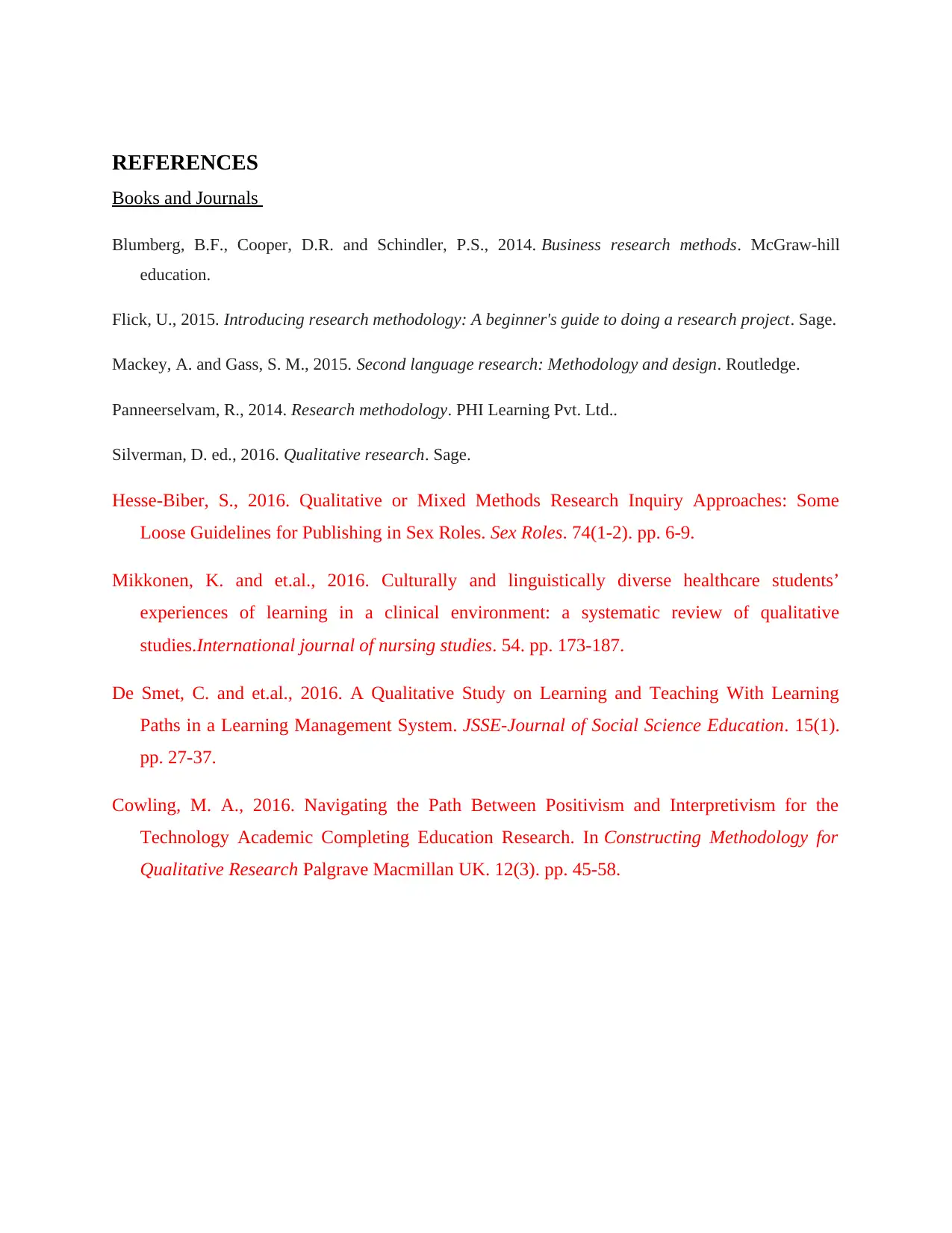
REFERENCES
Books and Journals
Blumberg, B.F., Cooper, D.R. and Schindler, P.S., 2014. Business research methods. McGraw-hill
education.
Flick, U., 2015. Introducing research methodology: A beginner's guide to doing a research project. Sage.
Mackey, A. and Gass, S. M., 2015. Second language research: Methodology and design. Routledge.
Panneerselvam, R., 2014. Research methodology. PHI Learning Pvt. Ltd..
Silverman, D. ed., 2016. Qualitative research. Sage.
Hesse-Biber, S., 2016. Qualitative or Mixed Methods Research Inquiry Approaches: Some
Loose Guidelines for Publishing in Sex Roles. Sex Roles. 74(1-2). pp. 6-9.
Mikkonen, K. and et.al., 2016. Culturally and linguistically diverse healthcare students’
experiences of learning in a clinical environment: a systematic review of qualitative
studies.International journal of nursing studies. 54. pp. 173-187.
De Smet, C. and et.al., 2016. A Qualitative Study on Learning and Teaching With Learning
Paths in a Learning Management System. JSSE-Journal of Social Science Education. 15(1).
pp. 27-37.
Cowling, M. A., 2016. Navigating the Path Between Positivism and Interpretivism for the
Technology Academic Completing Education Research. In Constructing Methodology for
Qualitative Research Palgrave Macmillan UK. 12(3). pp. 45-58.
Books and Journals
Blumberg, B.F., Cooper, D.R. and Schindler, P.S., 2014. Business research methods. McGraw-hill
education.
Flick, U., 2015. Introducing research methodology: A beginner's guide to doing a research project. Sage.
Mackey, A. and Gass, S. M., 2015. Second language research: Methodology and design. Routledge.
Panneerselvam, R., 2014. Research methodology. PHI Learning Pvt. Ltd..
Silverman, D. ed., 2016. Qualitative research. Sage.
Hesse-Biber, S., 2016. Qualitative or Mixed Methods Research Inquiry Approaches: Some
Loose Guidelines for Publishing in Sex Roles. Sex Roles. 74(1-2). pp. 6-9.
Mikkonen, K. and et.al., 2016. Culturally and linguistically diverse healthcare students’
experiences of learning in a clinical environment: a systematic review of qualitative
studies.International journal of nursing studies. 54. pp. 173-187.
De Smet, C. and et.al., 2016. A Qualitative Study on Learning and Teaching With Learning
Paths in a Learning Management System. JSSE-Journal of Social Science Education. 15(1).
pp. 27-37.
Cowling, M. A., 2016. Navigating the Path Between Positivism and Interpretivism for the
Technology Academic Completing Education Research. In Constructing Methodology for
Qualitative Research Palgrave Macmillan UK. 12(3). pp. 45-58.
⊘ This is a preview!⊘
Do you want full access?
Subscribe today to unlock all pages.

Trusted by 1+ million students worldwide
1 out of 9
Related Documents
Your All-in-One AI-Powered Toolkit for Academic Success.
+13062052269
info@desklib.com
Available 24*7 on WhatsApp / Email
![[object Object]](/_next/static/media/star-bottom.7253800d.svg)
Unlock your academic potential
Copyright © 2020–2025 A2Z Services. All Rights Reserved. Developed and managed by ZUCOL.





